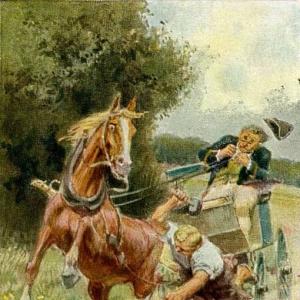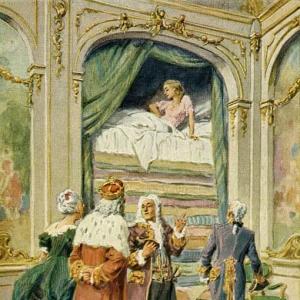Reading time for children: 8 min
Henry was lazy, and although he had nothing else to do but drive his goat daily to pasture, he nevertheless groaned when he went home after his day’s work was done. „It is indeed a heavy burden,“ said he, „and a wearisome employment to drive a goat into the field this way year after year, till late into the autumn! If one could but lie down and sleep, but no, one must have one’s eyes open lest it hurts the young trees, or squeezes itself through the hedge into a garden, or runs away altogether. How can one have any rest, or peace of one’s life?“ He seated himself, collected his thoughts, and considered how he could set his shoulders free from this burden. For a long time all thinking was to no purpose, but suddenly it was as if scales fell from his eyes. „I know what I will do,“ he cried, „I will marry fat Trina who has also a goat, and can take mine out with hers, and then I shall have no more need to trouble myself.“
So Henry got up, set his weary legs in motion, and went right across the street, for it was no farther, to where the parents of fat Trina lived, and asked for their industrious and virtuous daughter in marriage. The parents did not reflect long. „Birds of a feather, flock together,“ they thought, and consented. So fat Trina became Henry’s wife, and led out both the goats. Henry had a good time of it, and had no work that he required to rest from but his own idleness. He only went out with her now and then, and said, „I merely do it that I may afterwards enjoy rest more, otherwise one loses all feeling for it.“
But fat Trina was no less idle. „Dear Henry,“ said she one day, „why should we make our lives so toilsome when there is no need for it, and thus ruin the best days of our youth? Would it not be better for us to give the two goats which disturb us every morning in our sweetest sleep with their bleating, to our neighbor, and he will give us a beehive for them. We will put the beehive in a sunny place behind the house, and trouble ourselves no more about it. Bees do not require to be taken care of, or driven into the field. They fly out and find the way home again for themselves, and collect honey without giving the very least trouble.“ – „Thou hast spoken like a sensible woman,“ replied Henry. „We will carry out thy proposal without delay, and besides all that, honey tastes better and nourishes one better than goat’s milk, and it can be kept longer too.“
The neighbor willingly gave a beehive for the two goats. The bees flew in and out from early morning till late evening without ever tiring, and filled the hive with the most beautiful honey, so that in autumn Henry was able to take a whole pitcherful out of it. They placed the jug on a board which was fixed to the wall of their bed-room, and as they were afraid that it might be stolen from them, or that the mice might find it, Trina brought in a stout hazel-stick and put it beside her bed, so that without unnecessary getting up she might reach it with her hand, and drive away the uninvited guests. Lazy Henry did not like to leave his bed before noon. „He who rises early,“ said he, „wastes his substance.“
One morning when he was still lying amongst the feathers in broad daylight, resting after his long sleep, he said to his wife, „Women are fond of sweet things, and thou art always tasting the honey in private. It will be better for us to exchange it for a goose with a young gosling, before thou eatest up the whole of it.“ – „But,“ answered Trina, „not before we have a child to take care of them! Am I to worry myself with the little geese, and spend all my strength on them to no purpose.“ – „Dost thou think,“ said Henry, „that the youngster will look after geese? Now-a-days children no longer obey, they do according to their own fancy, because they consider themselves cleverer than their parents, just like that lad who was sent to seek the cow and chased three blackbirds.“ – „Oh,“ replied Trina, „this one shall fare badly if he does not do what I say! I will take a stick and belabour his skin for him with more blows than I can count. Look, Henry,“ cried she in her zeal, and seized the stick which she had to drive the mice away with, „Look, this is the way I will fall on him!“ She reached her arm out to strike, but unhappily hit the honey-pitcher above the bed. The pitcher struck against the wall and fell down in fragments, and the fine honey streamed down on the ground. „There lie the goose and the young gosling,“ said Henry, „and want no looking after. But it is lucky that the pitcher did not fall on my head. We have all reason to be satisfied with our lot.“ And then as he saw that there was still some honey in one of the fragments he stretched out his hand for it, and said quite gaily, „The remains, my wife, we will still eat with a relish, and we will rest a little after the fright we have had. What matters if we do get up a little later the day is always long enough.“ – „Yes,“ answered Trina, „we shall always get to the end of it at the proper time. Dost thou know that the snail was once asked to a wedding and set out to go, but arrived at the christening. In front of the house it fell over the fence, and said, ‚Speed does no good.'“
 Learn languages. Double-tap on a word.Learn languages in context with Childstories.org and Deepl.com.
Learn languages. Double-tap on a word.Learn languages in context with Childstories.org and Deepl.com.Backgrounds
Interpretations
Adaptions
Summary
Linguistics
„Lazy Henry“ is a lesser-known fairy tale collected by the Brothers Grimm, Jacob and Wilhelm Grimm, who were German academics, linguists, cultural researchers, and authors. They are best known for their collection of German and European folktales, which they compiled in a volume titled „Kinder- und Hausmärchen“ (Children’s and Household Tales), first published in 1812. The collection has been translated into many languages and includes popular tales such as „Cinderella,“ „Snow White,“ „Hansel and Gretel,“ and „Rapunzel.“
The Brothers Grimm gathered these stories through a combination of literary research and by listening to oral accounts from various sources, including friends, acquaintances, and local storytellers. Their goal was to preserve the rich oral storytelling tradition of Germany and Europe, which was at risk of being lost due to industrialization and urbanization.
„Lazy Henry“ is a prime example of the moral and cautionary tales that were popular in the Brothers Grimm’s collection. The story is intended to teach lessons about the importance of hard work, personal responsibility, and the consequences of idleness. The tale also showcases the wit and humor characteristic of many folktales, as well as the Brothers Grimm’s keen interest in human nature, societal values, and cultural beliefs.
While „Lazy Henry“ is not as widely known as other Grimm fairy tales, it still holds an important place in the literary tradition of fairy tales and folklore, offering a unique perspective on themes such as laziness, contentment, and the changing nature of work and responsibility.
„Lazy Henry“ can be interpreted in several ways, highlighting themes such as laziness, contentment, and the consequences of idleness.
Laziness and idleness: The story serves as a cautionary tale about the dangers of laziness and the importance of hard work. Both Henry and Fat Trina are content to avoid responsibility, and their laziness ultimately leads to the loss of their honey. This could be seen as a metaphor for missed opportunities or wasted potential due to idleness.
Contentment and simplicity: Despite their laziness, Henry and Trina seem to be genuinely content with their simple life. They do not strive for material wealth or status but are satisfied with the few pleasures they have. This could be interpreted as a commentary on the value of appreciating the simple things in life and finding contentment in what one has.
Consequences of inaction: The story illustrates the consequences of inaction and the importance of taking responsibility for one’s actions. When Henry and Trina fail to take care of their goats and bees, they miss out on potential benefits, such as having a steady supply of honey. Their lack of effort and initiative is further emphasized by their carelessness in breaking the honey jug.
The changing nature of work and responsibility: Henry’s comments about disobedient children can be seen as a reflection of shifting generational attitudes towards work and responsibility. This could be interpreted as a commentary on the need for adaptability and understanding in a changing world, as well as the importance of instilling strong values and work ethic in future generations.
Overall, „Lazy Henry“ can be interpreted as a tale that offers lessons about the importance of hard work, personal responsibility, and the value of contentment in a simple life. However, it also highlights the consequences of idleness and the need for adaptability in a changing world.
The fairy tale „Lazy Henry“ has inspired several adaptations in various forms of media. Here are a few notable examples.
Children’s books: There are several children’s books that have adapted the story of „Lazy Henry“ in various ways, such as changing the main character’s name or setting. For example, „The Lazy Boy“ by Margot Zemach is a picture book adaptation that takes place in the American West, with the main character being a lazy cowboy.
Theater: The tale has also been adapted for the stage. The Children’s Theater Company in Minneapolis created a musical adaptation of the story called „Lazy Perro,“ which incorporates Mexican folklore and culture.
Film: There have been a few film adaptations of the story, including a Soviet animated film called „Lazybones“ (1984) and a German live-action film called „Lazy Harry“ (2000).
Television: The tale has been adapted for television as well, with an episode of the British children’s series „Jim Jam and Sunny“ retelling the story in a simplified form for young viewers.
Video games: The tale has even been adapted into a video game called „Lazy Harry: The Complete Collection,“ which features puzzle-solving elements and mini-games based on the story.
Overall, the story of „Lazy Henry“ has proven to be a versatile and enduring tale that has inspired adaptations across various forms of media.
„Lazy Henry“ is a fairy tale by the Brothers Grimm that tells the story of a man named Henry who is incredibly lazy and seeks to live a life free from work and responsibility. Henry decides to marry a woman named Fat Trina, who also has a goat, so that she can take care of his goat as well, allowing him to be even lazier. The couple gets married and Fat Trina takes care of both goats, but she too is idle and seeks an easier life.
Fat Trina suggests they trade their goats for a beehive, as bees require less care and produce honey, which can be stored for longer periods. They make the trade, and the bees work tirelessly, filling the hive with honey. The couple stores the honey in a jug in their bedroom, keeping a stick nearby to ward off any mice or thieves.
One day, as they are lazing in bed, Henry suggests they trade the honey for a goose and a gosling. Trina disagrees, stating that they need a child to take care of the geese, but Henry believes that modern children are disobedient and not worth the trouble. Trina, in a fit of passion, demonstrates how she would discipline an unruly child, swinging the stick wildly and accidentally smashing the honey jug.
The honey spills all over the floor, ruining their plans for trading it. However, Henry and Trina take the accident in stride, content with their current lazy lifestyle. They eat the remaining honey and continue to enjoy their idle existence, unconcerned with the passing of time, as they believe that everything will work out in the end, just like the slow-moving snail who still reached its destination.
The fairy tale „Lazy Henry“ by the Brothers Grimm offers a humorous yet insightful look into the themes of laziness, complacency, and misguided problem-solving.
Here’s a linguistic analysis of the text:
Narrative Style and Perspective
Third-Person Omniscient Narrator: The story is told from a third-person omniscient perspective, providing insights into Henry’s thoughts and emotions, as well as overarching commentary on the events, which is a common characteristic of folktales.
Dialogue and Direct Speech: The use of direct speech gives the characters of Henry and Trina more depth and personality, presenting them as comically lazy and naive in their reasoning.
Language and Tone
Simple, Colloquial Language: The Brothers Grimm use simple and accessible language, which is characteristic of fairy tales intended for broad audiences, including children.
Humor and Irony: The tale is laden with irony and humor, particularly in how it portrays the couple’s laziness and impracticality. For instance, Henry’s justification of laziness with sayings like „He who rises early, wastes his substance,“ adds a layer of humor. The story’s events underscore the irony of their laziness as it leads to more work and ultimately, a total loss (i. e. , the honey pitcher breaking).
Proverbial Wisdom: The tale uses pseudo-wisdom and proverbs, such as „Birds of a feather, flock together“ and the anecdote about the snail, to convey moral lessons about idleness and foolishness.
Themes and Morals
Laziness and Inaction: The primary theme is the folly of laziness. Henry’s initial problem-solving leads to greater issues, symbolizing how inactivity and reliance on others for one’s responsibilities often result in chaos.
Misguided Optimism: Henry and Trina’s plans are based on unrealistic expectations. Their optimism is guided more by convenience than reason, leading to their downfall. This reflects the broader moral lesson of being wary of quick, easy solutions to complex problems.
Complacency and Satisfaction: The story ends without a significant change in Henry and Trina’s character; they remain complacent despite their loss, highlighting the moral flaw of contentment in mediocrity.
Symbolism
The Goats and Beehive: These elements symbolize labor and reward. The exchange of goats (more labor-intensive) for a beehive (requiring less direct effort) reflects the couple’s desire for a reward without work.
The Honey Pitcher: The honey pitcher represents their misguided hopes and the precariousness of relying on luck over effort. Its breaking is a metaphor for the collapse of their unrealistic plans and serves as a deus ex machina that resolves the tale with a moral lesson.
Characters
Henry and Trina: Both characters are portrayed as comically lazy and shortsighted. Their dialogue and actions serve to make them sympathetic in their foolishness, allowing readers to laugh at their misfortunes while recognizing their own potential for similar folly.
The Neighbor: This character is mentioned only in passing but serves as a functional foil, highlighting the community aspect and the social dynamics around barter and exchange typical of rural settings in fairy tales.
In summary, „Lazy Henry“ employs humor, irony, and simple language to portray the themes of laziness and its consequences. It uses character interactions and symbolic elements to explore the folly of seeking shortcuts in life, ultimately serving as a cautionary tale with a comedic touch.
Information for scientific analysis
Fairy tale statistics | Value |
|---|---|
| Number | KHM 164 |
| Aarne-Thompson-Uther-Index | ATU Typ 1430 |
| Translations | DE, EN, DA, ES, PT, HU, IT, JA, NL, PL, RU, TR, VI, ZH |
| Readability Index by Björnsson | 33.1 |
| Flesch-Reading-Ease Index | 77.6 |
| Flesch–Kincaid Grade-Level | 7.8 |
| Gunning Fog Index | 10 |
| Coleman–Liau Index | 7.7 |
| SMOG Index | 8.1 |
| Automated Readability Index | 8.3 |
| Character Count | 5.218 |
| Letter Count | 4.005 |
| Sentence Count | 46 |
| Word Count | 1.002 |
| Average Words per Sentence | 21,78 |
| Words with more than 6 letters | 113 |
| Percentage of long words | 11.3% |
| Number of Syllables | 1.269 |
| Average Syllables per Word | 1,27 |
| Words with three Syllables | 33 |
| Percentage Words with three Syllables | 3.3% |

















